- News
- Reviews
- Bikes
- Accessories
- Accessories - misc
- Computer mounts
- Bags
- Bar ends
- Bike bags & cases
- Bottle cages
- Bottles
- Cameras
- Car racks
- Child seats
- Computers
- Glasses
- GPS units
- Helmets
- Lights - front
- Lights - rear
- Lights - sets
- Locks
- Mirrors
- Mudguards
- Racks
- Pumps & CO2 inflators
- Puncture kits
- Reflectives
- Smart watches
- Stands and racks
- Trailers
- Clothing
- Components
- Bar tape & grips
- Bottom brackets
- Brake & gear cables
- Brake & STI levers
- Brake pads & spares
- Brakes
- Cassettes & freewheels
- Chains
- Chainsets & chainrings
- Derailleurs - front
- Derailleurs - rear
- Forks
- Gear levers & shifters
- Groupsets
- Handlebars & extensions
- Headsets
- Hubs
- Inner tubes
- Pedals
- Quick releases & skewers
- Saddles
- Seatposts
- Stems
- Wheels
- Tyres
- Health, fitness and nutrition
- Tools and workshop
- Miscellaneous
- Tubeless valves
- Buyers Guides
- Features
- Forum
- Recommends
- Podcast
news
Local Conservative leader blasts “Active Travel Taliban” and brands cycle lane “a monumental waste of taxes”; Jonas Vingegaard beats Tadej Pogačar in epic Tour de France duel; Tour of Britain announced; ‘Cyclists dismount’ debate + more on the live blog
SUMMARY
No Live Blog item found.
 West Derby Road (Badly Parked Liverpool/Twitter)
West Derby Road (Badly Parked Liverpool/Twitter)10 July 2024, 08:07

Are people who want safe cycle lanes the “Active Travel Taliban”? One local Conservative leader thinks so, as he brands new cycling scheme “a monumental waste of taxes” and a “recipe for disaster” – but cyclists say he’s “wildly out of touch with reality”
Over the years, cyclists and cycling campaigners have been described in many, often extremely unflattering ways by motorist angry at them for the simple crime of riding on the road or calling for the introduction of safe, protected cycle infrastructure.
So it’s fair to say we’re well used to it by now.
But you know things are starting to get a bit heated and tetchy in the local council chamber when politicians start slinging phrases like ‘the Active Travel Taliban’ about. Yes, really.
That particularly colourful metaphor was the brainchild of Wirral Council Conservative leader Jeff Green, who this week branded the Labour-run local authority’s plans for a continuous protected cycle lane connecting Birkenhead and Liscard as “bonkers”.
The proposed 3.5-mile new cycle lane, which forms phase one of a wider active travel project hoping to link Birkenhead to New Brighton, will, says Wirral Council, “make streets safer for local people and provide high quality facilities for pedestrians and cyclists”, tying into a broader regeneration scheme and helping “deliver a sustainable left bank of the Mersey which includes increased levels of journeys being undertaken by active modes as a key part of the vision”.
Funded by active travel grants awarded to the Liverpool City Region Combined Authority, a recent Wirral Council environment committee report said that the scheme needed to be delivered between 2027 and 2032, or Wirral could face “losing out on a significant funding opportunity”.
However, speaking after the council’s latest consultation on the project this week, Wirral Conservative leader Jeff Green claimed that the “majority” of residents were “against the scheme”, the Wirral Globe reports.
“In February, I was invited by Cllr. Ian Lewis to meet with him, and the Leader of the Council, and the RNIB and hear their concerns over this proposal,” Green said. “It was clear then that the proposals for so-called floating bus stops and sharing the pedestrianised Liscard Precinct with cyclists is a recipe for disaster.
“Following complaints from local councillors, the Town Hall was forced to re-run the consultation and the results are, frankly, damning.
“The views of residents are clear – this is a monumental waste of taxes. A scheme that does not command the support a majority of the people most affected is not, in my view, viable. Wirral Council does not ‘know best’ – we exist to serve our residents.
“And in spite of the ‘Active Travel Taliban’, residents remain opposed to the loss of parking, pedestrian crossings, and trees that this scheme would require.”
Alright Jeff, tell us what you really think.
Meanwhile, Green’s Conservative colleague Lesley Rennie said the cycle lane “will be a disaster for residents and all road users”.
I think it’s fair to say that Green’s attempt to compare people who want to travel safely on their bikes to Afghanistan’s currently internationally unrecognised government has gone down well on social media…
As local Tories rally YET AGAIN to block/delay local active travel infrastructure, I'm reminded of this key point 💚 https://t.co/CaEXW5n7vI
— Cllr Ed Lamb (@edwardlamb) July 9, 2024
“More examples of the Tories being wildly out of touch with reality... ‘the active travel Taliban’?” wrote cycling campaigner Ben on X.
“Active Travel Taliban... haha... I mean, at this point all you can do is laugh and try to move on. There’s no rational discussion to be had,” added Mounsey, who also suggested that Green’s slogan could be used as part of a (frankly ill-advised) T-shirt campaign…
Responding to the local Tory leader’s comments, Ed Lamb, a Green Party councillor for the Wirral, wrote: “As I’ve said at a couple of recent talks, some elected folks just do not ever want this stuff to happen – even if they have voted otherwise in the past!
“They are not serious about regeneration, health, climate, and we are allowed to ignore them.
“On Wirral there is no overall control. Tories often hold a lot of sway on committee items. This one? Let’s hope not…”
10 July 2024, 15:40
Meet the new Transport team, same as the old Transport team? We’ll see…
This afternoon, the new Labour government unveiled its ministerial appointments at the Department for Transport. And I must say, I’m intrigued by the ‘Future of Roads’ position…
We’re pleased to confirm new Ministerial briefs at the Department for Transport:
@LouHaigh - Secretary of State@LordPeterHendy - Rail@LilianGreenwood - Future of Roads@simonlightwood - Local Transport@MikeKaneMP - Aviation, Maritime and Security pic.twitter.com/qiWY4DiTeK— Department for Transport (@transportgovuk) July 10, 2024
And while the DfT’s new intake have been careful not to utter the words ‘cycling’ or ‘walking’ just yet, Cycling UK welcomed the appointments, which they believe will mark a “step change” for active travel.
“It’s great to hear the new government wants to prioritise greener transport and better integrated transport networks as it seeks to ‘move fast and fix things’,” Sarah McMonagle, director of external affairs at Cycling UK, said today.
“With the new ministerial team at the Department for Transport now in place, we’re feeling optimistic that this will mark a step change in rhetoric, policy and funding for cycling and walking.
“Earlier this year, we had a very encouraging meeting with the new Secretary of State Louise Haigh who visited our DfT-funded e-bike project, Making cycling e-asier, in Sheffield. We’ve also met new Minister Simon Lightwood who held the shadow active travel brief in the last parliament. Simon also used to work in the NHS and was a cabinet member for public health, so will be well placed to ensure transport policy plays its part in prevention.
“The ministerial team also includes Lilian Greenwood and Mike Kane, who we know are keen cyclists and understand the challenges that can face people who cycle and those who want to cycle more. We look forward to working with the new ministerial team at DfT and their officials to ensure we realise the benefits of cycling, particularly the health benefits – a key Labour mission.”
10 July 2024, 14:32
Advantage Jonas Vingegaard? Defending champion lands huge psychological blow by catching and outsprinting Tadej Pogačar in epic battle in Massif Central
It’s fitting that just down the road from the Puy de Dôme, where that iconic photo of Jacques Anquetil and Raymond Poulidor, riding shoulder to shoulder on the climb’s savage slopes, was taken 60 years ago, the era-defining riders of the 2020s produced their own iconic image, one that may well encapsulate not only this year’s Tour de France, but also – perhaps – their entire careers.
On the tough drag to the finish in Le Lioran, Jonas Vingegaard and Tadej Pogačar sprinted side by side, way ahead of the rest, their faces contorted in pain, throwing their bikes at the line in unison, separated by the faintest of margins.
And just like that historic day back in 1964, the momentum of the race suddenly shifted.
Because, in what could prove a key psychological blow for the rest of this most exhilarating of grand tours, yellow jersey Pogačar – an expert in two-up sprints, with a perfect record in the discipline at the Tour – was beaten.
Vingegaard, after three months of recovery and turmoil, is back to winning ways. And, despite the prognosis of almost everyone in cycling just a matter of weeks ago, he looks like he can win his third straight Tour de France.
Is there room for this in the history books? 🤩
Y'a-t-il de la place pour cela dans les livres d’histoire ? 🤩#TDF2024 pic.twitter.com/ONC6pFOiHL
— Tour de France™ (@LeTour) July 10, 2024
30km back down the road, however, it all looked so different.
Pogačar, after instructing his team to ride aggressively all day on the lumpy, taxing roads of the Massif Central, had flown on the Puy Mary, a swaggering image of verve and panache. His Danish rival didn’t, and almost certainly couldn’t, respond.
But at the bottom of the following climb, the Col de Pertus, Vingegaard found his old, pre-crash self, dropping Roglič and bridging across to the yellow jersey, who suddenly looked panicked, devoid of confidence.
Pogačar won the sprint for bonus seconds on the Pertus, but even that seemed perfunctory – the momentum had clearly shifted in the Dane’s favour.
Stalemate followed, as grand tour racing’s Big Four engaged in a two-up time trial to the finish, interrupted only by Roglič’s late crash on the tricky, fast run-in, as Remco Evenepoel – as Remco Evenepoel does so well – limited his losses to just 25 seconds.
In the sprint, the script UAE had crafted for over 180km today was ripped up completely. Vingegaard launched, tentatively. Pogačar was even more stuttering in following, the Slovenian uncharacteristically rising and slumping into his saddle repeatedly, as he strained to draw level with the Visma-Lease a Bike leader, who had enough in the tank to throw his bike, victoriously, at the line.
A sporting handshake later, and an acknowledgement: the battle for yellow is on.
Sporting rivalry at its peak 🙌#TDF2024 pic.twitter.com/Sd3wuxg2Lg
— Tour de France™ (@LeTour) July 10, 2024
“It’s very emotional for me, coming back from the crash,” Vingegaard said, fighting back the tears, at the finish.
“It means a lot, all the things I went through in the last three months – yeah, it makes you think of that. I would never have been able to do this without my family. I’m just happy to be here, it means so much to win a stage, especially to win it for my family, who supported me the whole time.
“I couldn’t follow his attack, it was very strong. I just had to fight, and I didn’t think I’d make it back. But I made it back, and started relaying with him – and I was surprised I could beat him in the sprint.
“It means so much to me. I’m so happy. I would never have thought this three months ago.”
Jonas Vingegaard started today’s stage 1.15 down on Tadej Pogačar. He’s now 1.14 behind his career-defining rival.
Every second counts, they say. And, as the narrative of this 2024 Tour de France shifts dramatically, that single second gained in Le Lorian could count more than any in Vingegaard’s entire Tour career.
10 July 2024, 15:39
Meanwhile, on Bardet corner…
Scenes, proper French scenes:
Un an après le virage Pinot, le virage Bardet ! 💙🤍❤️
Suivez le Tour de France en intégralité sur Eurosport avec #LesRP #TDF2024 pic.twitter.com/Kt8eDRbo0F
— Eurosport France (@Eurosport_FR) July 10, 2024
The UCI are going to fine him for taking that flag, aren’t they?
10 July 2024, 15:20
Alliteration (and terrible excuses) police at the ready
10 July 2024, 14:12
Let the Tour de France commence! Vingegaard bridges across to Pogačar on Col de Pertus
🇩🇰 Jonas Vingegaard is very strong! After pulling away from @EvenepoelRemco, he drops @rogla and gradually gets back on @TamauPogi!
🇩🇰 Jonas Vingegaard est très fort ! Après avoir distancé @EvenepoelRemco, il lâche @rogla et revient petit à petit sur @TamauPogi !#TDF2024 pic.twitter.com/8OKOYf6Z4m
— Tour de France™ (@LeTour) July 10, 2024
Jonas Vingegaard is banishing any doubts over his post-crash form and fitness, isn’t he? The Dane, after failing to follow the classic Pogačar attack on the Puy Mary, rode a perfectly calculated Col de Pertus, the day’s penultimate climb, to drop Roglič and bridge an almost 30-second gap to the yellow jersey, who duly outsprinted him for the eight-second bonus.
One Cat 3 climb to go, and the Tour de France’s Big Two of the 2020s are together at the front of the race, as the stage, and GC, hangs perfectly in the balance. Have I said how this great this race is yet?
10 July 2024, 13:56
“Steady, Tadej, steady!” Pogi’s scary moment on the descent
Steady, Tadej, steady!#TDF2024 pic.twitter.com/B7vM4rs37G
— ITV Cycling (@itvcycling) July 10, 2024
And… deep breath.
Back to the climbing, where the yellow jersey currently holds a 35-second advantage over his GC rivals as he hits the Col de Pertus. Don’t scaring us anymore, Tadej, my heart can’t take all this.
10 July 2024, 13:00
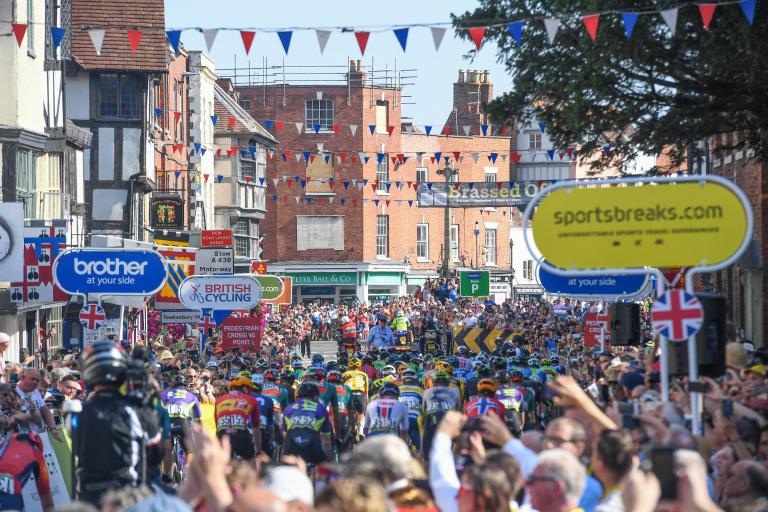
“British Cycling have moved heaven and earth to save the Tour of Britain”: Tour of Britain returns with Kelso start, as first details of stages released for revamped stage race in “huge statement on the health of the British cycling scene”
British team Saint Piran have described this afternoon’s unveiling of most of the stages of the revamped 2024 Tour of Britain as “incredible news and a huge statement on the health of the British cycling scene”.
This year’s Lloyd’s Bank Tour of Britain, the 20th edition of the race in its modern format and the first since the demise of previous organisers SweetSpot, will take place between Tuesday 3 September and Sunday 9 September in a new shortened six-day format, new organisers British Cycling announced today.
The opening stage will see the race return to the Scottish Borders, starting and finishing in the cobbled market square of Kelso, with a circuit finish.
(Alex Whitehead/SWpix.com)
The race then crosses into England for stage two in the Tees Valley, from Darlington to Redcar, which will take in the popular Saltburn Bank climb before finishing on the seafront.
The Tour will return to South Yorkshire for the first time since 2007 on stage three, starting in Sheffield and finishing in Barnsley, while the details of stage four will be announced over the next month.
The penultimate stage, meanwhile, will start and finish in Northampton which has hosted two stages of the Tour of Britain Women in the past.
Starting from the promenade in Lowestoft, the final stage on the Sunday will take in roads regularly used on the Tour over the last two decades, finishing in Felixstowe, where Wout van Aert won last year.
(Alex Whitehead/SWpix.com)
Unveiling the stage details, British Cycling Events Managing Director, Jonathan Day, said: “We’re delighted to be bringing top-level racing and the joy of cycling to communities across the country in September, with six stages to showcase the very best of Britain’s character and terrain.
“We’re enormously thankful to the local partners who are supporting the delivery of this year’s race, as we look to build on the momentum of June’s successful Lloyds Bank Tour of Britain Women. I’ve no doubt that their communities will be out in force to welcome the riders, and make it another memorable week of racing to cap off a huge summer of cycling.”
Meanwhile, one of the local teams that hopes to light up the racing in September, Saint Piran, welcomed today’s “incredible news”, which it believes will provide a welcome boost to Britain’s flailing cycling scene.
(SWpix.com/Simon Wilkinson)
“This is incredible news and a huge statement on the health of the British cycling scene,” Saint Piran owner Richard Pascoe said today.
“Jon Dutton and his team at British Cycling have moved heaven and earth to save the Lloyds Bank Tour of Britain Men. Millions of cyclists and cycling fans across the world will breathe a huge sigh of relief that we have established both a women’s and men’s Tour going forward.
“Over 31 million people watched last year’s race on TV with over a million by the roadside. This event is part of what is an epic summer of sport alongside Wimbledon, the Euros, and the Olympics and the more companies that understand its impact, the more partners cycling can bring on board.
“If the media, teams and riders work together we can make it even better than last year and continue to build a strong UK cycling infrastructure!”
10 July 2024, 13:45
Boom!
He never stops, does he?
Towards the top of the brutally steep Pas de Peyrol, after his UAE team had destroyed the lead group, yellow jersey Tadej Pogačar did what he does best and attacked, 31km from today’s finish in Le Lioran.
💥 BOOM! @TamauPogi attacks with 31 km to go!
💥 BOOM ! @TamauPogi attaque à 31 km de l'arrivée !#TDF2024 pic.twitter.com/LVXHXjHhtH
— Tour de France™ (@LeTour) July 10, 2024
Jonas Vingegaard and an increasingly strong Primož Roglič couldn’t match the race leader’s acceleration, though so far are keeping him within touching distance on the rapid descent into the next climb (though Vingegaard briefly dropped his teammate on the climb).
Remco Evenepoel, meanwhile, appeared to struggle for the first time at this Tour, and is currently 40 seconds down on the flying Slovenian – who just had his own hairy moment on a corner, which proves that nothing is ever written in stone at the Tour.
On what was earmarked as a breakaway day, we have a GC battle on our hands!
10 July 2024, 13:31
Watch out Wout!
Wout van Aert there, keeping everything safe for his Visma team leader Jonas Vingegaard heading into the crucial final climbs of today’s stage… by overcooking a bend and riding into a barrier:
💥¡Caída de Wout van Aert a 45 kilómetros! #TDF2024
El belga cayó en una curva en la que se subió a la acera.#TourRTVE10j
El primer coche de Visma tuvo que seguir con el resto del equipo y no pudo detenerse.
📺Sigue la etapa en Teledeporte y RTVE Play.https://t.co/429BjSP6Hl pic.twitter.com/01ht2CUd6w
— Teledeporte (@teledeporte) July 10, 2024
Ouch. Decent save though, as that could have been a whole lot worse.
After WVA’s ill-judged corner, UAE Team Emirates have now taken control (safely) on the Pas de Peyrol, as the remnants of the early breakaway Oier Lazkano, Ben Healy, and Richard Carapaz now appear doomed…
10 July 2024, 12:46
“The incidents are intimidating and causing stress and alarm to our members. Some have not ridden as a result and we as a club are avoiding that village until police action has been taken”
A cycling club ride leader has stressed the importance of cyclists running cameras on the road after being told that police were unable to investigate a series of “intimidating” incidents involving the same driver across multiple days in the same small village.
Sean Price, a lifetime member of Westbury Wheelers Cycling Club, claims the club’s rides have been targeted numerous times by the driver, who has passed the group too closely and shouted abuse on more than one occasion.
Read more: > Cycling club repeatedly harassed by same driver frustrated over lack of police action, saying incidents are “intimidating and causing stress and alarm to members”
10 July 2024, 12:17
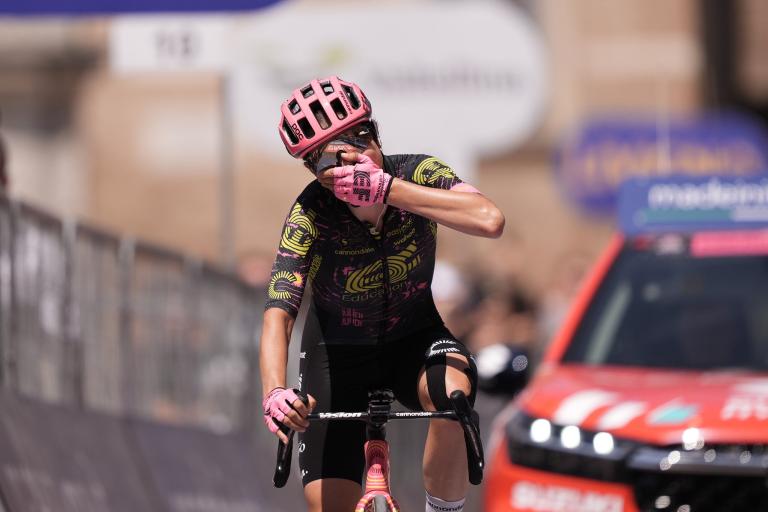
“I thought at one point they were going to catch me, but they never did!” Canadian Clara Emond pulls off epic 40km solo escape to take first pro victory at Giro d’Italia, as Elisa Longo Borghini and Lotte Kopecky locked in electric duel behind
The Tour de France isn’t the only grand tour with a brutally lumpy stage and some sensational today, as Canadian Clara Emond pulled off a stunning 40km-solo escape in the Apennines to secure the first professional victory of her career on stage four of the Giro d’Italia Women.
The EF Education-Cannondale rider, who is racing only her second full year as a pro, went clear with a small group with 100km to go, before attacking her breakaway companions on the steep San Marino climb, soon building up a three-minute advantage as she approached the long draggy ascent – and final steep, cobbled ramp – to Urbino.
Despite a concerted effort by the super-strong Kim Le Court (whose ride across to the escape group from the peloton appeared to be rocket-fuelled) and a resurgent Cecilie Uttrup Ludwig (whose attacking instincts move her up to third place on GC), the lack of cohesion in the counterattacking chase behind played into Emond’s hands, as she had time to savour her breakthrough victory, crossing the line 17 seconds ahead of Soraya Paladin.
🫅 Raw emotions from breakaway queen Clara Emond after her first pro victory every 🥹
🫅 Emozioni vere quelle di Clara Emond all’arrivo, è la sua prima vittoria da professionista in carriera 🥹#GirodItaliaWomen #WonderfulWomen pic.twitter.com/nCOOTvpGOq
— Giro d'Italia Women (@girowomen) July 10, 2024
“Today the goal was to be aggressive, so I took a chance at the beginning and kept attacking, and at some point it went,” the 27-year-old said at the finish.
“I knew if I had a small advantage in the climb I could hold on. But I thought at one point they were going to catch me, but they never did! And I really started to believe it in the last climb. It feels really special to have my first win at the Giro.”
This battle between Longo Borghini and Kopecky wasn't really about the stage but just some alpha top dog asserting of dominance
Longo Borghini coming up over the top in pink...Elisa shows she won't back down this Giro!#GirodItaliaWomen pic.twitter.com/LH4ubHIR5u
— Mathew Mitchell (@MatMitchell30) July 10, 2024
Meanwhile, in the bunch behind, Elisa Longo Borghini and Lotte Kopecky continued their epic duel for overall victory, Kopecky putting the pressure on up the Strade Bianche-style finishing climb, only for the pink jersey to winch her way past on the line in a statement of intent. No time differences then between the big two, but it’s fair to say the mind games in Urbino belonged to Longo Borghini.
10 July 2024, 11:45
Council says it will ask contractors to remove ‘Cyclists Dismount’ signs at road works
Last month, you may remember, the issue of ‘Cyclists Dismount’ signs, and what many cyclists regard as their discriminatory nature, popped up once again, after cyclists and active travel campaigners in Poole hit out at the decision to install signs advising people on bikes to “dismount and use footway” where a cycle lane was closed while works were carried out by a gas company.
Those instructions were branded “unacceptable” by locals, who claimed they have led to frequent “horrifying” close passes by motorists overtaking cyclists at the temporary traffic lights.
In response to this criticism, Bournemouth, Christchurch, and Poole (BCP) Council claimed that – despite cyclists noting that the signs fail to adhere to the Department for Transport’s road works code of practice – the signage does in fact “comply to the required legal standards”, because the cycle lane in question is not mandatory.
Meanwhile, the gas company behind the works, SGN, added that it had been “advised” to tell cyclists to dismount “due to the location of the gas main and width of the road”.
However, BCP Council appears to have performed a U-turn on the issue over the past month, telling active travel campaigners in the area that it does not use ‘Cyclists Dismount’ signs anymore and will be advising contractors working in the area to avoid using them.
After the local BH Active Travel group wrote to the council about the “inappropriate” signs “being used at various road works around BCP”, in a bid to ascertain their position on the matter, the local authority’s active travel team said: “This is not something that our Neighbourhood Services team would use anymore but we do find that they are unfortunately sometimes put out by Utility companies completing various works around the conurbation.
“Where this happens we have been reporting this to the company in question and asking them to remove them.”
“So BCP are aware that these signs should not normally be used and will ask for them to be removed if contractors incorrectly use them,” the group’s admin Ross Hodder said.
“They are not legally enforceable as they are advisory only signs. However this is probably not widely known and they create conflict with some motorists who may think cyclists are not allowed to use the carriageway.”
10 July 2024, 11:17
Don’t try this at home! Brompton meets BMX
Folding bike manufacturer Brompton has this week, ahead of the Paris Olympics, unveiled a brand-new Team GB special edition version of its lightweight P Line model, featuring a colour scheme and patterns that apparently represent the athletic attributes and disciplines on show at the Games.
So what better way to show off a new Olympic-special folding bike than by putting it through its paces on a BMX track, courtesy of Freestyle world champion Kieran Reilly?
A special P Line for a special team, created in celebration of Team GB and the Paris 2024 Olympic Games, world champion and soon-to-be Olympian Kieran Reilly took one for a spin. ⚠ DO NOT TRY THIS AT HOME ⚠
Available to buy on 17.07.24https://t.co/xtdpYWyXfE pic.twitter.com/ha1S3IzcuI
— Brompton Bicycle (@BromptonBicycle) July 10, 2024
I’m not sure that kind of riding will catch on during the morning commute, of course…
10 July 2024, 10:59
Nightmare for Cofidis as both Ion Izagirre and Alexis Renard abandon Tour de France early on stage 11, and Fred Wright struggles at the back
Ouch. While bunny-hopper supreme Axel Zingle is busy attacking off the front, at the back of the race his Cofidis team are having a proper nightmare, as both Ion Izagirre, a double Tour de France stage winner, and Alexis Renard (who’s in my Fantasy League team, most importantly) have been forced to abandon the Tour de France early on stage 11.
❌ Both 🇪🇸 Ion Izagirre and 🇫🇷 @alexisrenard_ have abandoned the race.
❌ 🇪🇸 Ion Izagirre et 🇫🇷 @alexisrenard_ ont tous deux abandonné la course. #TDF2024 pic.twitter.com/EVMUcuc3Os
— Tour de France™ (@LeTour) July 10, 2024
Languishing minutes behind the peloton from the opening kilometres of today’s tough and relentlessly chaotic stage, it was clear something was up with Izagirre and Renard, with Cofidis now confirming on social media that the pair were “diminished for several days and exhausted”, leading to their withdrawal this morning.
Meanwhile, as the pace shows no signs of relenting at the front, Bahrain-Victorious’ former British champion Fred Wright is also struggling off the back, over 5km behind the peloton and just in front of the broomwagon, and will be desperately hoping for a swift halt to hostilities.
Which, unfortunately for Fred, doesn’t look like it’s going to happen anytime soon…
10 July 2024, 10:34
“We sadly see all too often the shocking consequences of motorists driving while under the influence of drugs and alcohol”
A driver under the influence of alcohol and cannabis when she hit and killed a cyclist, before fleeing the scene of the fatal collision, has been jailed for eight years and eight months. Jessica Berry was also given a five-year driving ban, which is to commence on her release from prison, after she admitted to causing the death of 40-year-old James Raeburn last autumn.
Read more: > Eight-year jail sentence for hit-and-run driver under influence of alcohol and cannabis when she killed cyclist
10 July 2024, 10:15
The first reviews of Bradley Wiggins’ tenure on Lance Armstrong’s podcast are in…
Tried listening to Lance's pod to see what Wiggins has to say, he's brilliant at race analysis some times. There's 5 mins about a hat then 20 mins talking about helmet, electrolyte and ketone sponsors then 'whoever has the best legs will win the tour' 👍
— Joe Earley (@joeearley) July 10, 2024
I’ll admit that I haven’t brought myself to listen to the Big Tex, Big George, and (Big) Wiggo buddy fest since it was first unveiled at the weekend, but it’s nice to know that Lance’s patented formula of terrible ‘banter’, relentlessly flogging stuff, and banal sporting analysis remains stubbornly intact.
> “Back with the boys!” Sir Bradley Wiggins joins Lance Armstrong’s podcast during Tour de France
Oh, and it must be noted that cycling’s reliance on clichés focused on the abundance and quality of riders’ legs (looking at you, Tadej) almost drove poor Joe to madness this morning.
Hey Brad, did you pack the legs?
“When riders talk about ‘who’s got the legs’, ‘today I just didn’t have the legs’, I like to think there’s a finite amount, maybe one set per team,” he wrote, presumably laughing maniacally as he typed.
“On the team bus – Jonas: I need the legs today. Wout: But I want the legs. Jonas: You always get the legs. Kelderman: Guys, stop being such a pair of greedy leg hogs.
“Sometimes they need to find the good legs, I think they live in hotels at 3000m or something, but takes weeks to find them, they must be big hotels.”
Who says spending three weeks constantly watching a bike race can drive you mad?
10 July 2024, 09:52
Now, this is a proper Tour de France stage start!
After yesterday’s sleepy stage to Saint-Amand-Montrond, you’d have been forgiven for thinking that nobody was really interested in attacking or getting into the breakaway at this year’s Tour de France.
But this morning, thankfully, proper racing has returned to the Tour – with the start of today’s lumpy stage to Le Lioran featuring a constant stream of attacks, a cracking-looking breakaway featuring Wout van Aert, Ben Healy (who else?), Tom Pidcock, Oscar Onley, and Stevie Williams, a concerted chase by UAE Team Emirates (who clearly have their sights set on another Pogi stage win), an unfortunate crash for Kobe Goossens and Frank van den Broek, and a motorbike rider ending up in a ditch on a corner…
🏁 190KM
🚴♂️3⃣ < 9'' < 🚴♂️1⃣3⃣ < 22''< 🚴♂️🚴♂️🚴♂️🚗
There is a large group of some big names attempting to join the break.
La contre-attaque s'est formée avec de grosses pointures parmi le groupe.
🇮🇪 @_BHealyyy
🇪🇨 @RichardCarapazM
🇬🇧 @tompidcock
🇫🇷 @BrunoArmirail
🇫🇷… pic.twitter.com/NYneH8jmI0— Tour de France™ (@LeTour) July 10, 2024
And that’s why boring Tour de France stages like yesterday are necessary, ladies and gentlemen, just to save everybody’s legs for the upcoming, inevitable fireworks.
And just be thankful you were able to get plenty of work done yesterday as the riders chilled and Robbie McEwen recited the lyrics to Pink Cadillac – because you’re not going to be very productive this afternoon…
10 July 2024, 09:24
Mathieu Sells Chickens: Move over Alain Philippe, there’s a new misheard pro rider name in town…
You know it’s a quiet day on the Tour de France, when this child’s brilliantly confusing sign was the highlight of the day (along with Victor Campenaerts’ one-of-a-kind souvenir bidon, of course).
❌Mathieu van der Poel
✅Mathieu sells chickens 😂#TDF2024 pic.twitter.com/roEnUZVgKX— ITV Cycling (@itvcycling) July 9, 2024
To be honest, I’m still trying to work out whether it’s a sign of affection for the world champion, an insult, or the kid really thinks that’s MVDP’s name…
10 July 2024, 08:45
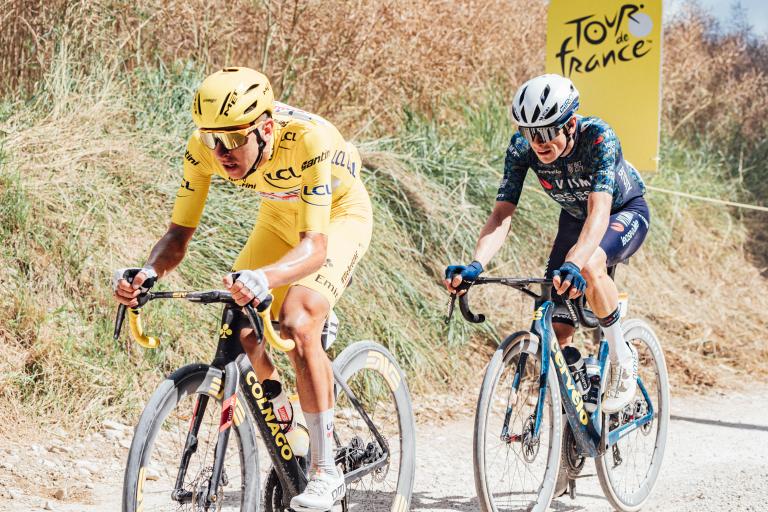
“Racing intelligently or not, it’s a nonsense. You need to have the best legs to win the Tour”: Tadej Pogačar weighs in on Jonas Vingegaard ‘wheel sucking’ discourse
A prolonged debate about a yellow jersey contender wheel sucking at the Tour de France? Have we just been transported back in time to the late noughties and the height of the Cadel Evans near miss era?
No, apparently not – but it’s clear that Jonas Vingegaard’s cautious, Gareth Southgate-esque approach to the first half of this year’s Tour has ruffled a few feathers in the peloton (and just like the England manager, may well see the Dane have the last laugh).
First, current second-placed rider Remco Evenepoel responded to two-time Tour winner Vingegaard’s less than helpful display in the Belgian’s short-lived attack on Sunday’s chaotic gravel stage by questioning whether the Visma-Lease a Bike leader had “the balls to race”.
And before yesterday’s stage, current yellow jersey wearer Tadej Pogačar – who has never been accused of failing to get stuck in when there’s racing to be had – dismissed claims that Vingegaard’s careful, methodical, “intelligent” Tour start (a probable consequence of the injuries sustained in his horrific Basque Country crash in April) would work in the Dane’s favour by the Tour’s third brutal week.
“Racing intelligently or not, it’s a nonsense in cycling. Right now I’m in the leader’s jersey – so for me, that’s intelligent to be in the lead now with a good gap,” Pogačar said.
“In the Tour de France, intelligence isn’t super important. It’s important, but you need to have the best legs to win the Tour.”
He’s behind you… as usual (Zac Williams/SWpix.com)
One thing’s for sure – Pog didn’t need to have the best legs to finish yesterday’s soporific stage across the centre of France, which only ignited in time for the final sprint, won by a relieved Jasper Philipsen after a textbook lead-out from Mathieu van der Poel.
“I’m getting older, so a bit boring is pretty welcome in my life!” the Slovenian laughed at the finish.
After admitting there was “nothing to do” during the long, uneventful stroll to Saint-Amand-Montrond, Pogačar also described today’s stage into the Massif Central, with its 211km distance and sting in the tail of four tough climbs, including the eight per cent gradients of the Puy Mary, as “questionable”.
"I'm getting older so a bit of boring is welcome in my life"
Tadej Pogačar was glad for a quieter day and previewed stage 11 💛🇸🇮#TDF2024 pic.twitter.com/s7okpDy0gR
— ITV Cycling (@itvcycling) July 9, 2024
“It’s really long, and a hard start, and a long way to the proper final climbs. We’ll see what will happen, but for sure we’ll have to stretch our legs on the final climb.”
Asked whether he’ll target the bonus seconds on the Col de Font-de-Cère, located just 3km from the finish in Le Lioran, the yellow jersey responded in typically nonchalant style: “I didn’t check! I guess so, let’s go for eight seconds…”
Which, having now said, you know he probably will…
10 July 2024, 09:38
From cycle racks and homes to bike shops and cycling events, the UK’s bike theft epidemic continues
In case you missed it last night, a cyclist has hit out at the “disgusting” bike thieves who targeted the recent Enve Stone Circle gravel cycling event in Salisbury, stealing at least eight bikes worth a combined value of £26,000.
The bikes, which were locked to racks located in the event village in the English Heritage site of Old Sarum, were taken between the finish of the popular gravel-focused sportive on the evening of Saturday 29 June and the following morning, when the event’s participants left the campsite.
Read more: > Cyclists left “shocked, saddened, and angry” after £26,000 worth of bikes stolen from cycling festival
After obtaining a PhD, lecturing, and hosting a history podcast at Queen’s University Belfast, Ryan joined road.cc in December 2021 and since then has kept the site’s readers and listeners informed and enthralled (well at least occasionally) on news, the live blog, and the road.cc Podcast. After boarding a wrong bus at the world championships and ruining a good pair of jeans at the cyclocross, he now serves as road.cc’s senior news writer. Before his foray into cycling journalism, he wallowed in the equally pitiless world of academia, where he wrote a book about Victorian politics and droned on about cycling and bikes to classes of bored students (while taking every chance he could get to talk about cycling in print or on the radio). He can be found riding his bike very slowly around the narrow, scenic country lanes of Co. Down.
Latest Comments
- Daclu Trelub 2 sec ago
[quote[However, when they were notified of it the day after the crash, it was not classed as a serious defect as it had not sunk more than 100mm.[...
- Daclu Trelub 7 min 58 sec ago
Great stuff, the BBC is simutaneously pissing off the Left and the Right. Doing its job properly.
- chrisonabike 10 min 56 sec ago
I've not seen anything particularly "scientific" on either side of the argument. As you say I think currently there are other variables in most...
- David9694 43 min 39 sec ago
Ram-raiders destroy Banbury M&S entrance in burglary https://www.oxfordmail.co.uk/news/24842236.ram-raiders-destroy-m-s-foodh...
- pait 1 hour 1 min ago
I used a Carradice saddle bag plus a full frame bag from Rogue Panda on a weeklong trip last year. Having only one of them would have made the trip...
- don simon fbpe 1 hour 49 min ago
Right whingers gonna whinge!
- bobrayner 2 hours 12 min ago
This is an article about exciting bikes for 2025...? If you want an article about exciting steel bikes in particular, I'm sure there's one from 1995.
- TheHungryGhost 2 hours 50 min ago
It was on Reporting Scotland - The BBC One Scotland news that comes on after the News at 6
- Backladder 4 hours 23 min ago
So it is only universal to the frames that are designed to work with it?
- mdavidford 6 hours 49 min ago
What a waste! - spending all that money on infrastructure on ships, when they don't even pay their bridge tax. And besides - no-one will use it -...
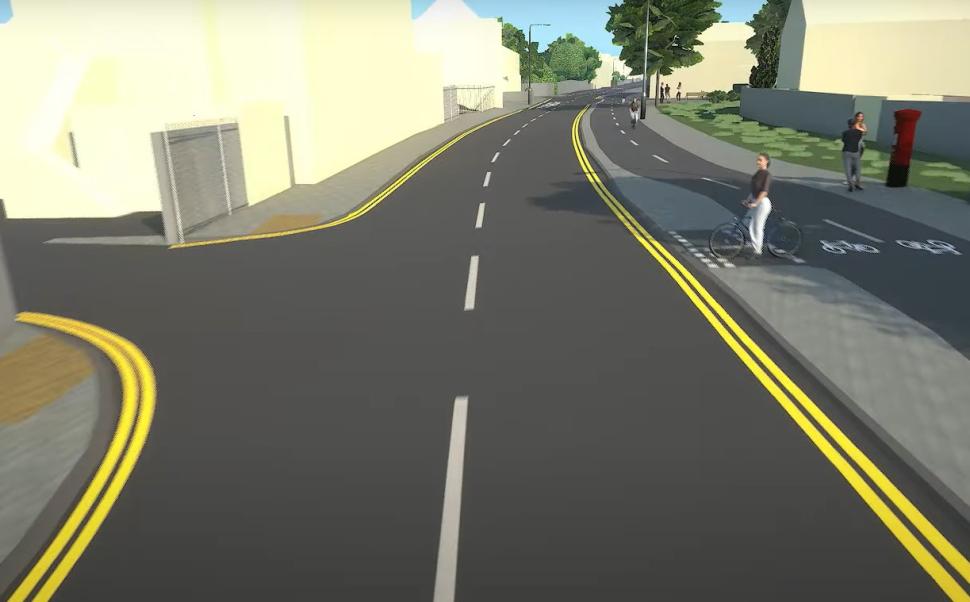
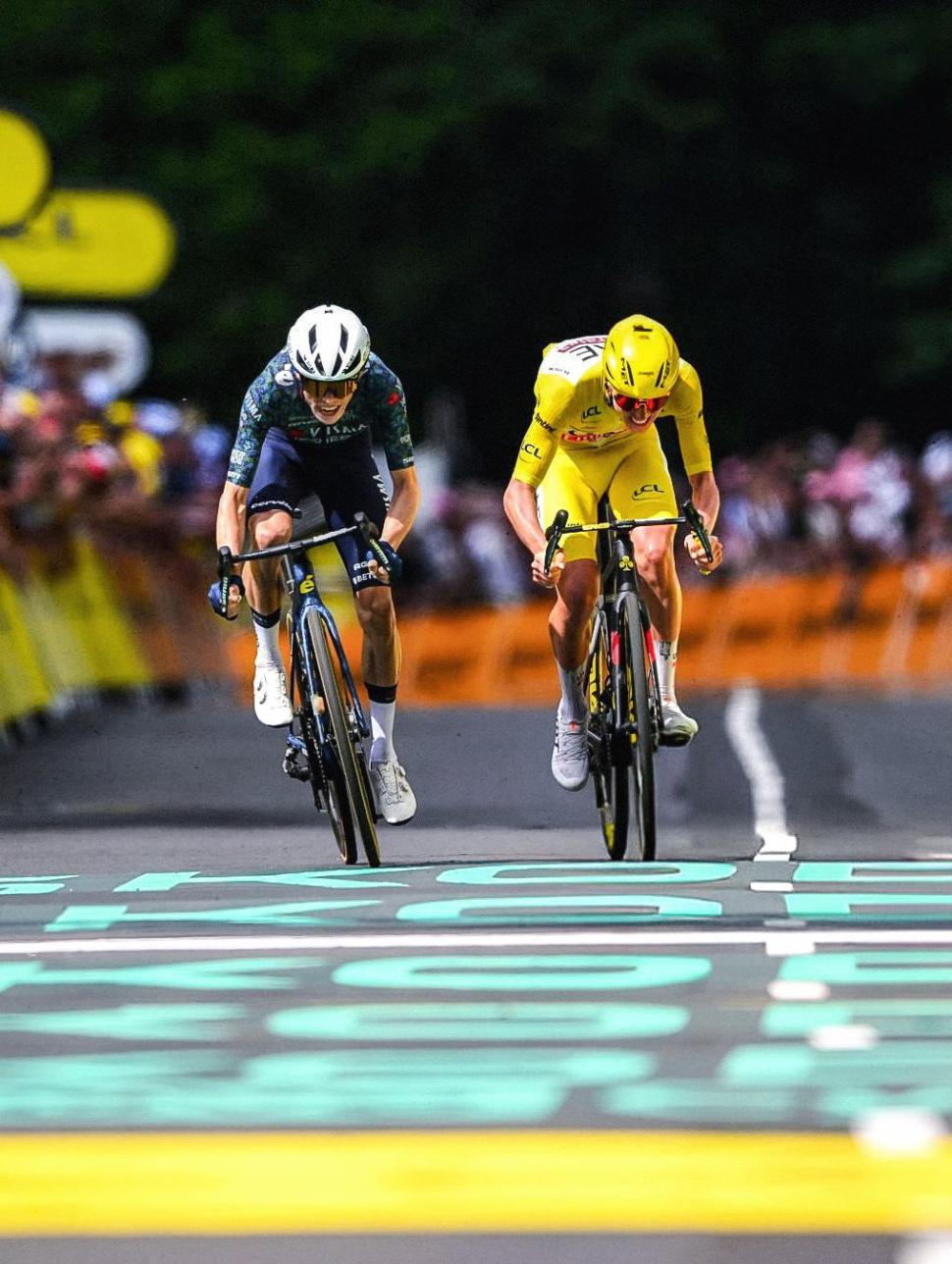

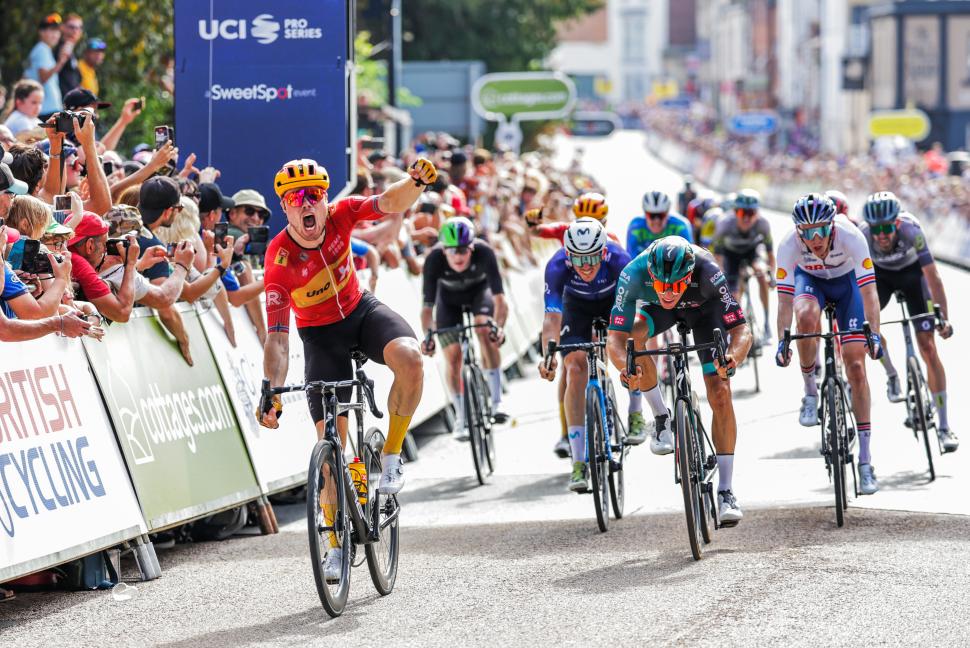

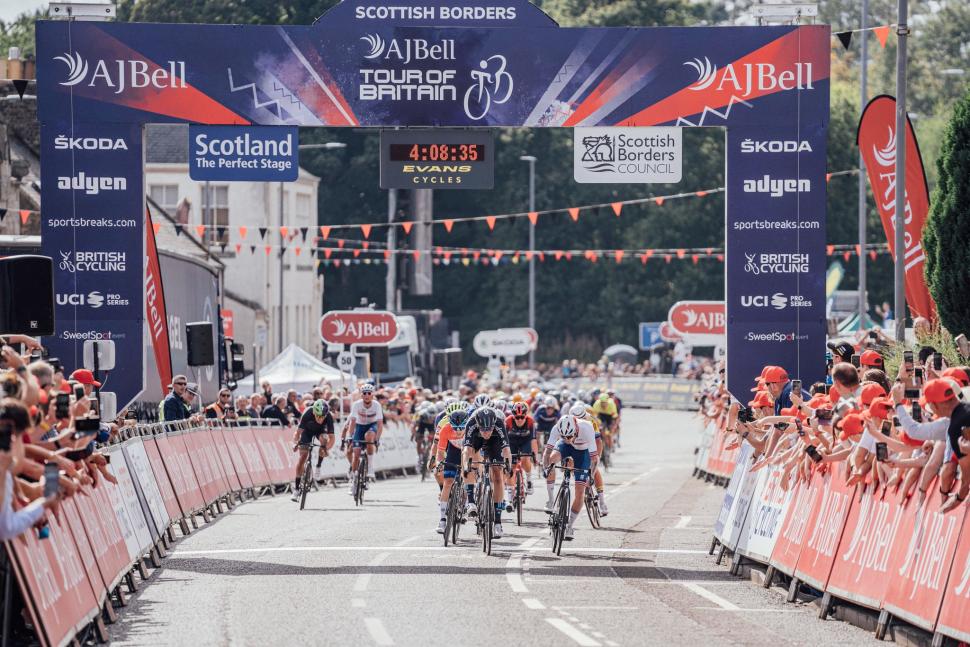





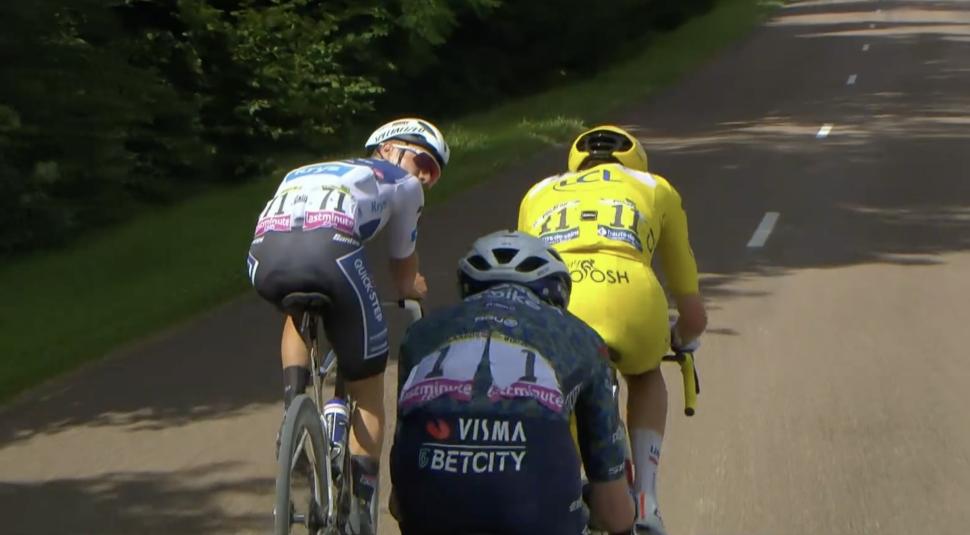
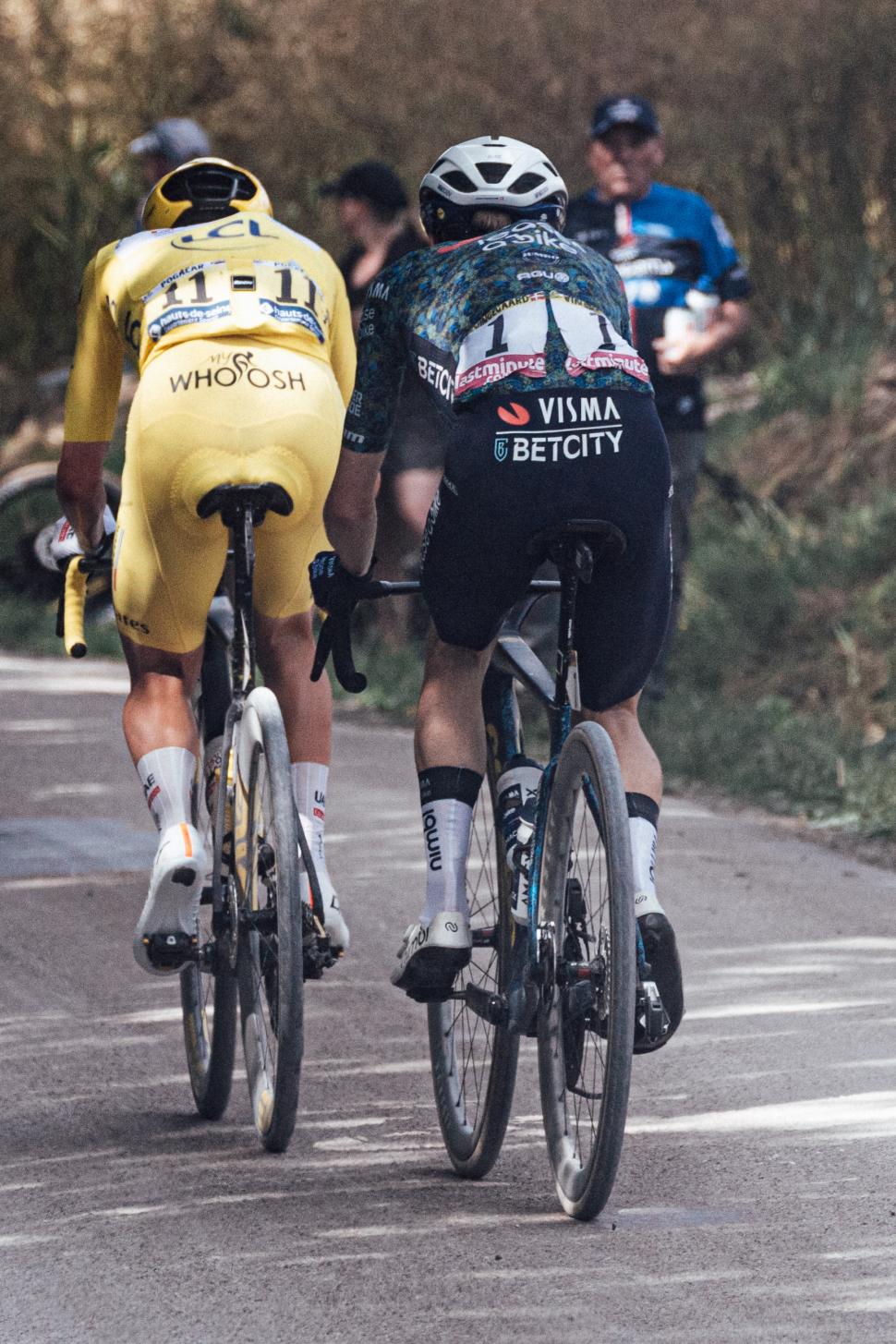
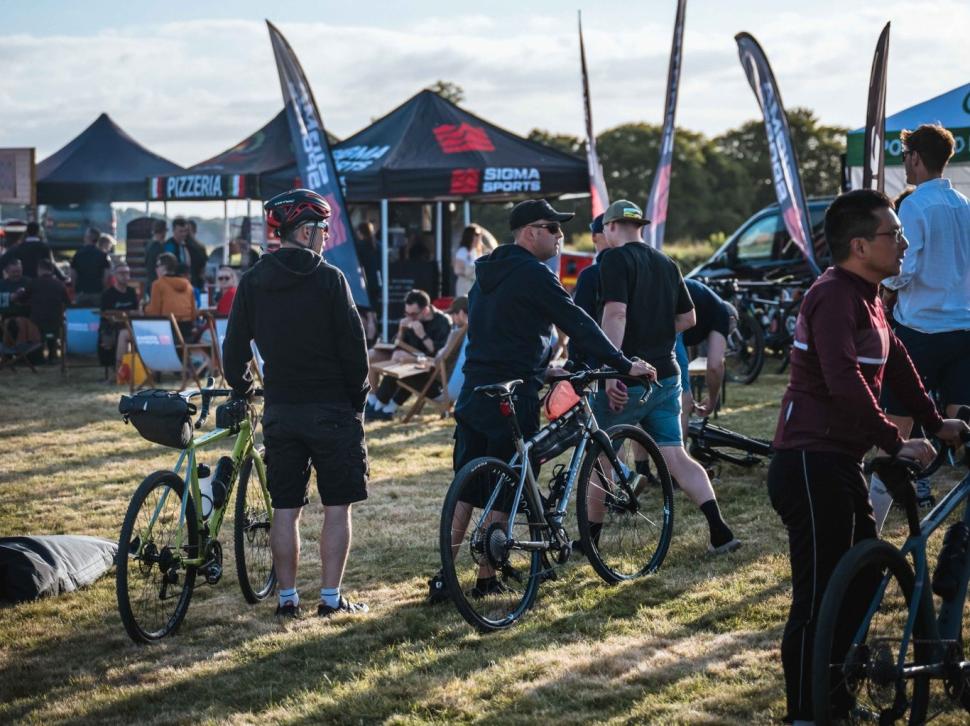
Add new comment
31 comments
Taliban are a bit mixed on this issue: they strongly approve of protective headgear but not hi-vis. Their approach to safety seems to focus on prayer, and as you say they're not really in favour of any mobility for about half the population.
On the plus side I'm not aware of them condemning cycling in general for cultural reasons, which puts them ahead of some UK politicians...
Pages